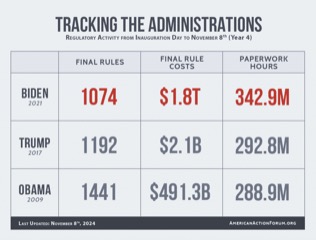
The White House /Flickr
The cost of the Biden-Harris administration’s regulations to taxpayers is $1.8 trillion – and still counting – according to a data-driven watchdog group that seeks to educate the public about the advantages of innovative, free-market policy solutions.
Dan Goldbeck, the director of regulatory policy at the nonprofit American Action Forum (AAF), wrote days after the election that its outcome signals “a return of the Trump Administration and its more deregulatory posture come January 20, 2025.”
Goldbeck cautioned, nevertheless, that Biden bureaucrats will be adding more regulatory costs to the nation before Trump is inaugurated in January:
For the time being … agencies under the current Biden Administration continue their regulatory programs apace. There were only eight rulemakings this past week that contained some kind of quantified economic impact, but a couple of them packed a punch. The week’s main rulemaking items included a Department of Homeland Security (DHS) proposal on cybersecurity standards for certain categories of public infrastructure and a Department of Health and Human Services (HHS) rule that brings sizable administrative burdens. Across all rulemakings, agencies published $3.1 billion in total costs and added 3.5 million annual paperwork burden hours.
AAF contrasted the cost of Biden’s agency regulations pushed on America by bureaucrats with those of his two predecessors. The alarming outcome is found in the chart below, which shows that, in sharp contrast to Biden’s $1.8 trillion, Donald Trump’s first administration cost America $2.1 billion in regulations costs, while the Obama administration clocked in at $491.3 billion.

Chart via American Action Forum
“As we have already seen from executive orders and memos, the Biden Administration has provided plenty of contrasts with the Trump Administration on the regulatory front,” Goldbeck reported. “And while there have been areas where the current administration has sought to broadly restore Obama-esque regulatory actions, there are also areas where it has charted its own course.”
Citing AAF’s work, Clyde Wayne Crews of Competitive Enterprise Institute (CEI) referred to Biden’s more-than $1 trillion in cost estimate for calendar year 2024 as “shocking.”
Crews observed much of that amount has been “driven primarily by the Environmental Protection Agency’s Multi-Pollutant Emissions Standards, which alone account for $870 billion.”
“With an incoming Trump administration aiming to eliminate ten rules for every new significant regulatory action, regulatory bodies stand to face increased scrutiny,” Crews wrote.
But he also took note of another Biden “milestone” – this time in the Federal Register, where the federal government publishes its rules and regulations.
As of November 12, the Biden administration’s total page count for 2024 was 89,476 pages.
“This is the second-highest yearly count of all time, with over a month and a half to go,” Crews echoed Goldbeck in observing Biden’s not done yet.
As Paul Bedard at the Washington Examiner reported last week, a couple of days after the election, Federal Election Commission Chairman Sean Cooksey called for Republicans in Congress to disapprove “any final rules that are rushed through in a lame-duck period … under the Congressional Review Act.”
“Every Biden-appointed agency head should also be on notice,” Cooksey posted to X. “It’s not just a repeal. It bans the agency from ever issuing a substantially similar rule again.”
“One of President Trump’s greatest opportunities next year is to cut the Biden administration’s red tape and to free American people and businesses from the bureaucracy,” Cooksey told Bedard. “I expect that President Trump and the Republican Congress will use all the tools at their disposal, including the powerful Congressional Review Act.”
Vivek Ramaswamy, who with Elon Musk has been tapped by Trump to co-lead the Department of Government Efficiency (DOGE), told Fox News’ Maria Bartiromo on Sunday that the executive branch will begin aggressive cost-cutting in the federal government, followed up by congressional action.
Addressing the glaring problem of what has become known as “the swamp,” Ramaswamy told the “Sunday Morning Futures” hostess that he and Musk plan to bring “sweeping change” to the federal government “as early and as quickly as possible”:
The failures of the executive branch need to be addressed because the dirty little secret right now is the people we elect to run the government, they’re not the ones who actually run the government. It’s the unelected bureaucrats in the administrative state that was created through executive action. It’s going to be fixed through executive action.
Citing recent decisions by the U.S. Supreme Court holding that “many of those regulations are unconstitutional at a large scale,” Ramaswamy said the mission of the new agency is “about restoring self-governance and accountability in America.”
“Most of the people making these decisions, from healthcare to the Department of Defense, are failing on effectiveness because they have no accountability,” he explained:
Historically, it’s been the view of many scholars to say that those people could not even be fired. Now we take a different view with the environment the Supreme Court has given us in recent years, and we’re going to use that in a pretty extensive way to move quickly.

